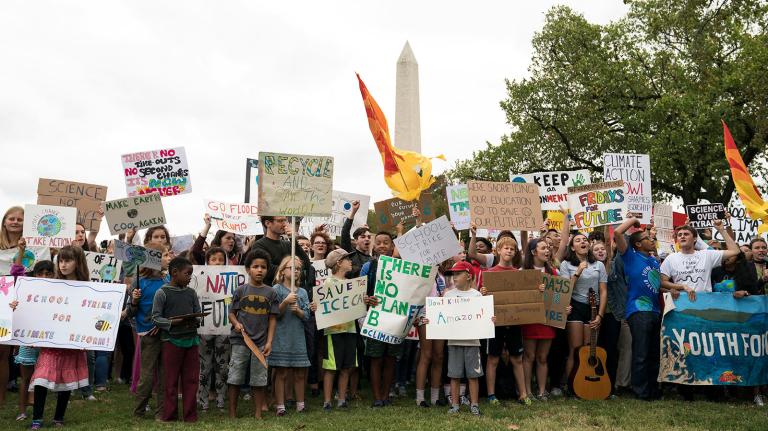This summer was a big one for climate change: CNN held a seven-hour town hall for the presidential candidates to talk climate platforms; TIME magazine devoted an entire issue to the topic; Big Little Lies even had a climate change episode. We’re having conversations about the climate crisis and climate solutions like never before.
But it’s not just the amount of air time we’re giving the climate crisis that’s shifting: It’s where we’re talking about it, and how. 2019 has been a year of youth climate strikes and record-setting heatwaves, and — probably not coincidentally — it’s also the year that pop music stars started speaking about climate change en masse, and not in a Farm-AID, “support this cause” kinda way.
In the past, celebrities have worked to “raise awareness” about the issue (looking at you, Leo) and made pretty terrible songs about it (you know the one, Lil Dicky). But now we’re seeing actual, quality pop music talking about the climate crisis from artists like Billie Eilish, Lana Del Rey, and (he claims) Lil Nas X. These are some of the biggest stars of our day, and they’re approaching climate change not as a political cause, but as part of our everyday reality.
Watch Billie Eilish’s “all the good girls go to hell” music video and I think you’ll start to see what I mean:
The song is clearly (and confirmedly) about climate change, but it doesn’t exactly feel like it’s pushing a message. There’s no request to donate to an organization, or, like, call your representative, and a discreet #climatestrike tag on the video page is the only hint of more traditional climate “activism.” That’s because Eilish is making an emotional statement here, not a political one: Her haunting black eyes, the dark, dystopian setting, the lines “hills burning in California / can’t say I didn’t warn ya” — together all serve to viscerally communicate the horror of living during the climate crisis.
Eilish, if you’ve been living under a rock, is a big freakin’ deal: The 17-year-old is the first, and so far only, artist born since 2000 with a #1 Billboard-debuting album. A somewhat unconventional pop star, Eilish is increasingly seen as speaking to, and for, the members of Gen Z who make up the bulk of her fan base. So the way Eilish talks about climate change in her music reveals a lot about how young people are making sense of this burning planet they’ve inherited.
There are plenty of other signs that the climate crisis, at least for The Youth, has gone from being a distant political issue to part of daily reality. Lil Nas X got some attention earlier this summer when he tweeted that lyrics in his song “Old Town Road” — which in August broke the record for longest-running Billboard #1 single — are in “reference to reversing the ongoing climate change, water pollution, and catastrophic political climate we are witnessing in these trying times.”
when i said “i got the horses in the back” it was in reference to reversing the ongoing climate change, water pollution, and catastrophic political climate we are witnessing in these trying times.
— ☆ ‧‧̩̥·‧•̥̩̥͙‧·‧̩̥˟͙冬˟͙‧̩̥l (@LilNasX) June 8, 2019
How we’re supposed to get from “I got horses in the back” to climate change is beyond me, and I’ve wondered if Lil Nas X — who is a joker on Twitter — just said it for the laugh, and the confusion and ridiculous theories that’d emerge as people tried connecting the two. Can you see it?
Still, even if Lil Nas X isn’t serious, and the most popular song in the history of radio isn’t about the climate crisis, reading the statement as a joke still says something about the absurdist gallows humor this generation has adopted in the face of overwhelming climate dread. (That’s the best I could do — if Lil Nas X wanted us to make ourselves crazy figuring out this statement, it worked!) Either way, that wasn’t the only time Lil Nas X took to Twitter to talk climate.
me and the bro talkin plans to reverse global warming pic.twitter.com/0FT1BsoHEv
— ☆ ‧‧̩̥·‧•̥̩̥͙‧·‧̩̥˟͙冬˟͙‧̩̥l (@LilNasX) July 26, 2019
If Billie Eilish and Lil Nas X are representing Gen Z, Lana Del Rey’s sadgirl vibes are emblematic of at least a segment of the Millennial generation that came before them. But Del Rey’s take, too, is different than what we’ve seen in music before now.
Most of the topics in Del Rey’s most recent album, “Norman fucking Rockwell,” explore the standard pop music fare: love, heartbreak, a failed relationship. But in “the greatest,” as we listen to Lana singing, “L.A. is in flames, it’s getting hot,” and “I’m facing the greatest / The greatest loss of them all,” we realize that these mundane dramas are set against a pretty somber backdrop.
There’s more climate pop music in the pipeline, too, most notably from Grimes, the queen of alt-pop, who is releasing an entire album about the climate crisis. She doesn’t have quite the same degree of mainstream popularity as Eilish or Lil Nas X — not many do — and her whole image is also based around being kinda … out there. From her absurd workout regimen and extreme creative process to creating a genre for herself called “Faé,” Grimes wouldn’t be Grimes if she wasn’t being a total weirdo.
But she’s a culturally significant weirdo, with hundreds of thousands of followers and over 2 million monthly listeners on Spotify. A few months ago, Grimes announced her upcoming album will be titled “Miss_Anthr0pocene,” saying in her Instagram announcement that “each song will be a different embodiment of human extinction as depicted through a Pop star Demonology.” The goal of the project? “make climate change fun (lol..??)” What, exactly, this will accomplish is hard to say, but that might be the point — there doesn’t have to be a point anymore.
Pop music has advanced its climate game way past the 1975 putting instrumental under a Greta Thunberg speech and calling it a song. Lil Nas X, Billie Eilish, Lana Del Rey, Grimes — none of them are making a point or trying to mobilize people around an agenda. They’re just artists doing what artists have always done: articulating and expressing the emotional experience of being alive in a given time and place. And part of what it means to be a young person right now is grappling with the beginning of your life likely coinciding with the end of life as we’ve known it.
Or, as Grimes puts it: “Welcome to the end of the world.”




